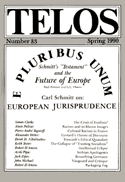As an occasional feature on TELOSscope, we highlight a past Telos article whose critical insights continue to illuminate our thinking and challenge our assumptions. Today, Johanna Schenner looks at Simon Clarke’s “The Crisis of Fordism or the Crisis of Social Democracy?” from Telos 83 (Spring 1990).
 Simon Clarke’s “The Crisis of Fordism or the Crisis of Social Democracy?” deals with the need to develop different economic strategies as the interventionist welfare state underwent many challenges and crises in the 1980s. The crumbling of communism further supported the idea that weak state interventionism often could not reach its stipulated economic goals. In comparison to the socialist critique of the state, the political right put forward measures and tools such as privatization to support its critique of the state by the following means: first, by focusing on the selective redistribution of income; and second, by bringing about a particular kind of Keynesian economic policy featuring military characteristics (73). The economic growth came to an end in 1987 when a global panic about the massive credit boom begun under Reagan and Thatcher broke wide open. Still, the right’s policies reached a new height with the waves of radical liberalization in the former communist countries as well as in the Third World. Clarke, however, expresses severe doubts about this strategy being the solution to neoliberalism’s economic strategy crisis (79).
Simon Clarke’s “The Crisis of Fordism or the Crisis of Social Democracy?” deals with the need to develop different economic strategies as the interventionist welfare state underwent many challenges and crises in the 1980s. The crumbling of communism further supported the idea that weak state interventionism often could not reach its stipulated economic goals. In comparison to the socialist critique of the state, the political right put forward measures and tools such as privatization to support its critique of the state by the following means: first, by focusing on the selective redistribution of income; and second, by bringing about a particular kind of Keynesian economic policy featuring military characteristics (73). The economic growth came to an end in 1987 when a global panic about the massive credit boom begun under Reagan and Thatcher broke wide open. Still, the right’s policies reached a new height with the waves of radical liberalization in the former communist countries as well as in the Third World. Clarke, however, expresses severe doubts about this strategy being the solution to neoliberalism’s economic strategy crisis (79).







